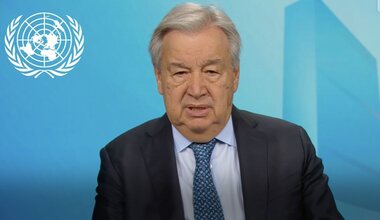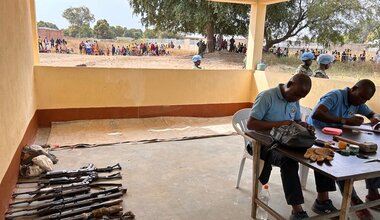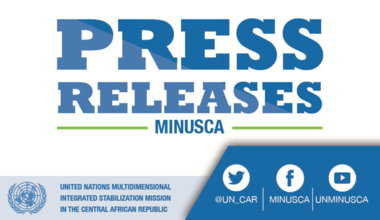Communiqué on the Ministerial-meeting on the Central African Republic
2. The participants welcomed President Touadéra’s vision to transform the country as well as his immediate priorities to address the root causes of the conflict and enable the country’s long-term development. The participants encouraged the Central African authorities to continue their efforts towards an inclusive approach, involving all elements of Central African society. The participants stressed the importance of concrete actions to rapidly advance the peace process and national reconciliation at all levels of society and to enable the return of the 468,000 refugees and the 384,000 internally displaced persons, in order that they regain their property and means of livelihood.
3. Recognizing that the continued presence of armed groups represents the country’s most immediate impediment to stability and recovery, the participants encouraged the CAR authorities to persist in their efforts to engage in a dialogue process with the representatives of the armed groups within the mechanisms envisaged to this effect with a view to allow for the launch, without further delay, of the national program for disarmament, demobilization, reintegration, and repatriation. The participants also encouraged the CAR authorities to ensure that this process fits within the larger framework of strategies intended to address the root causes of the conflict, in particular through an inclusive dialogue at the national and local level that promotes the equitable development of all regions of the country, as well as reducing their isolation. The participants stressed that these efforts should go hand in hand with the implementation of concrete reforms in the security, defence and justice sectors and would receive the steadfast support of the United Nations Multidimensional Integrated Stabilization Mission in the Central African Republic (MINUSCA) as well as of the rest of the international community.
4. President Touadéra introduced the proposal of the Central African Government for the Framework of Mutual Accountability between the Government and its international, regional and bilateral partners. The President reiterated his intention to finalize the document for the international conference on Central African Republic in Brussels as a strong signal of an enduring partnership between the Central African Republic and the international community to secure a durable peace. The President emphasized that the Framework of Mutual Accountability (CEM-RCA) and the process of the Recovery and Peace Consolidation in the Central African Republic (RCPC) should establish a cohesive and complementary framework to guide the relationship between CAR and its international partners. Participants welcomed the Framework of Mutual Accountability as an important mechanism for a continued high level, strategic partnership between the Central African Republic and the international community.
5. The participants highlighted the critical role that the CAR partner and donor conference, scheduled to be held in Brussels on 17 November, will play to secure essential resources in order to enable the implementation of priorities aimed at the recovery and stabilization of the country during the next three to five years. The participants also expressed concern at the funding shortfall hindering an adequate response to the on-going humanitarian crisis in CAR, with 2.3 million persons in need of aid. The participants agreed to work together in the coming weeks to encourage pledges in support of these priorities, including from potential new donors to CAR. They also highlighted the need for the Government to commit to structural reforms in governance, decentralisation and management of public finances in order for these funds to be used efficiently, as well as the importance of long-term donor engagement, including through the International Support Group.
 UN
UN United Nations Peacekeeping
United Nations Peacekeeping




